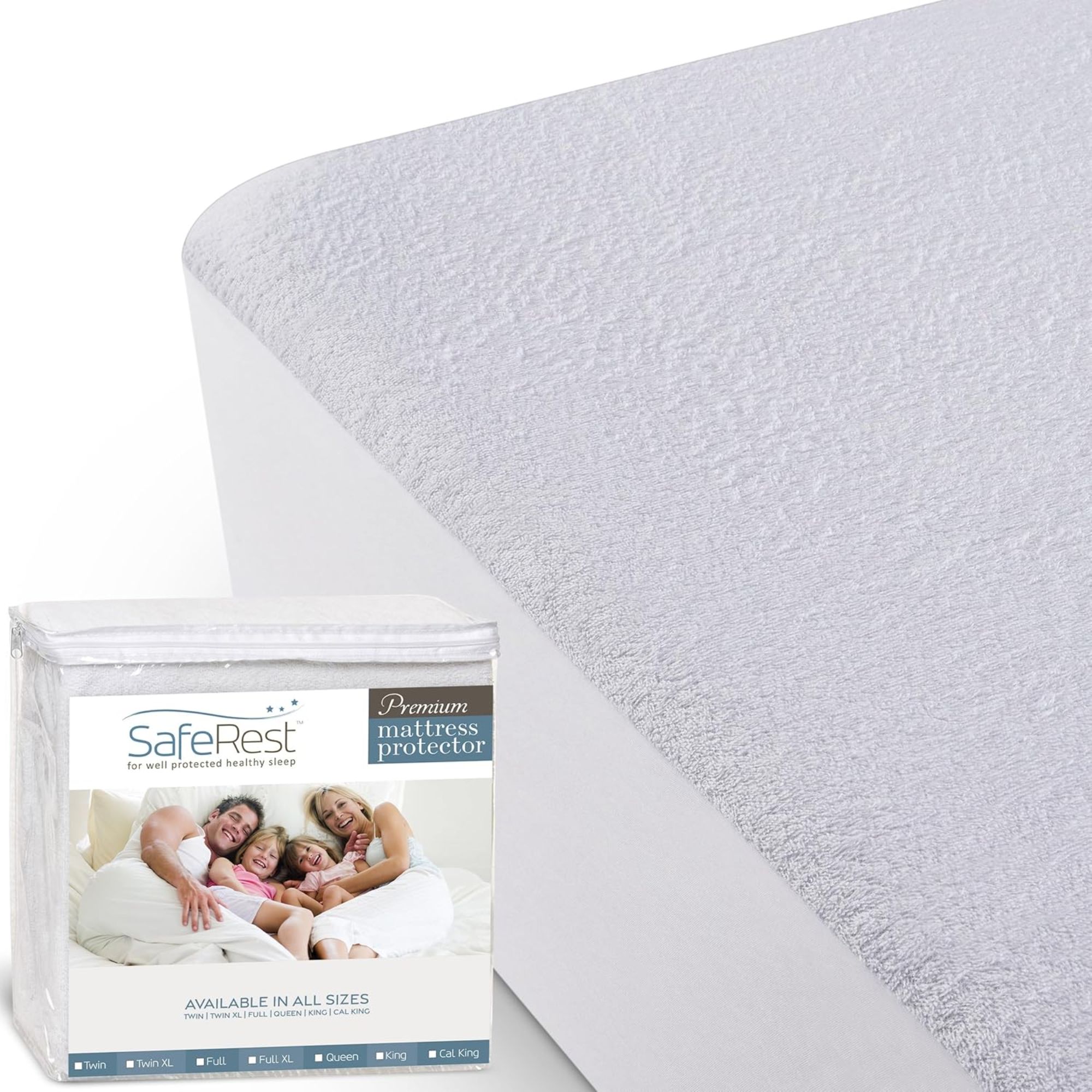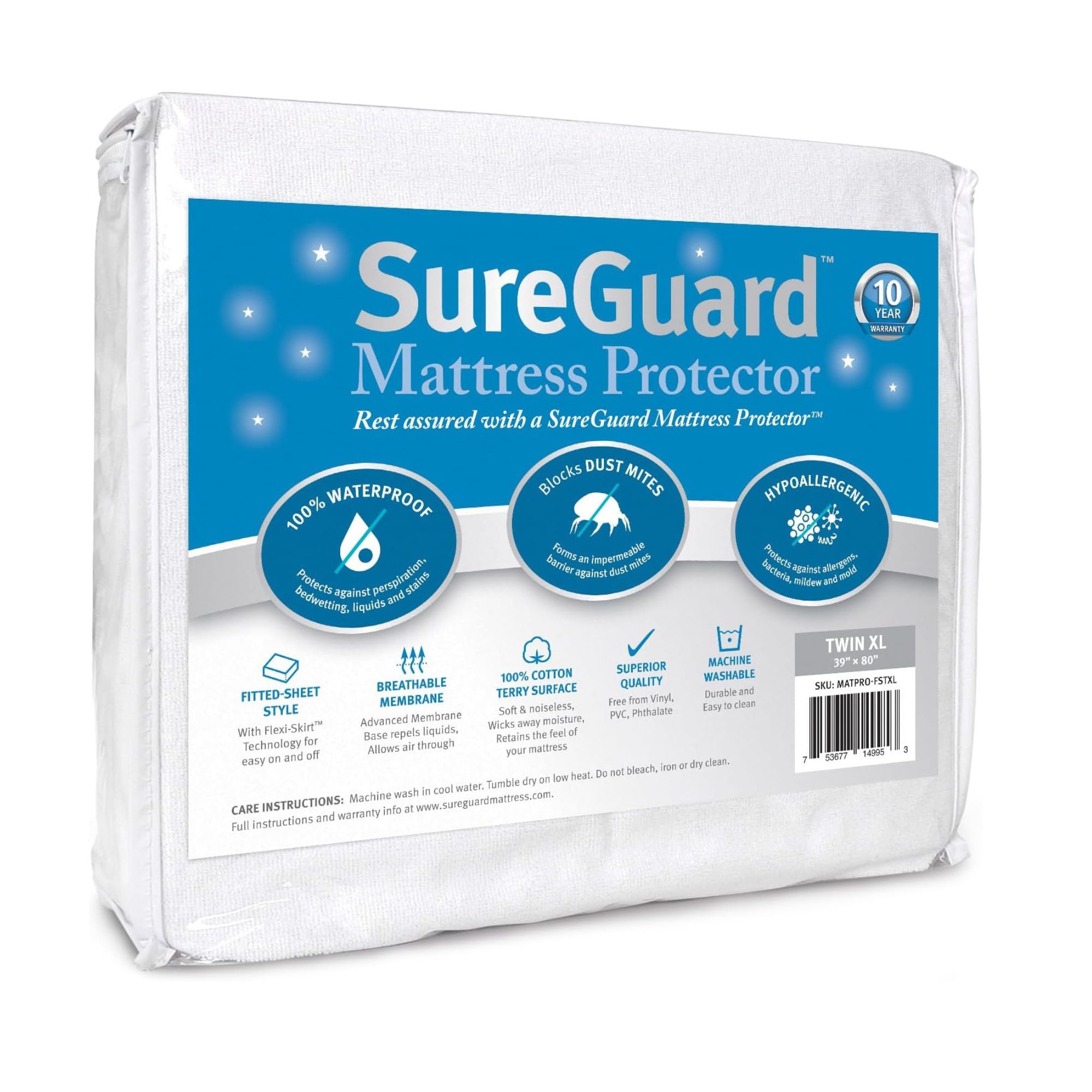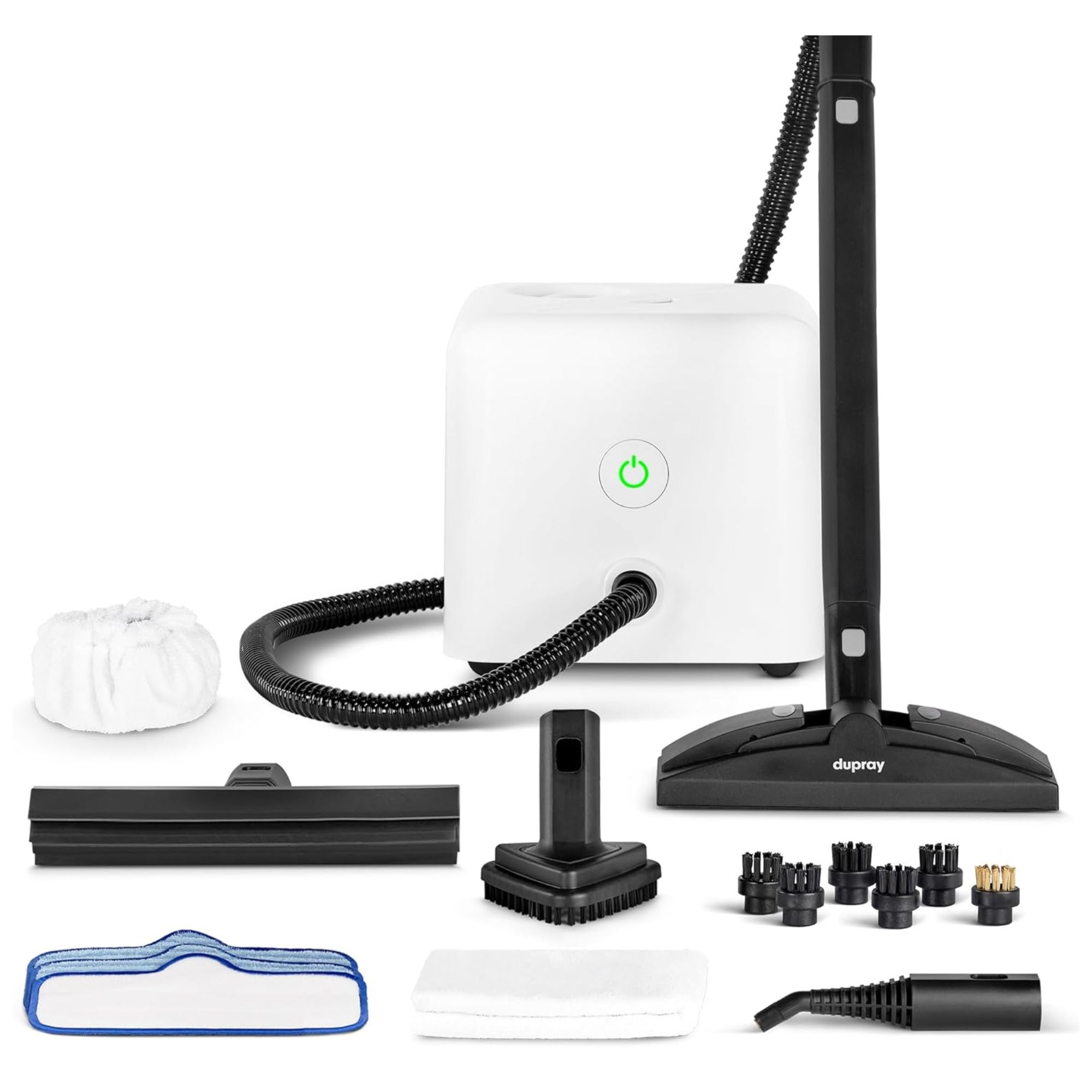How to clean and care for a mattress to enjoy years of blissful, comfortable use – the Homes & Gardens ultimate guide
Clean, store, and protect your mattress to perfection with these expert tips


Since we spend around one-third of our lives in bed, knowing how to clean and care for a mattress is important for good hygiene and sleep.
After all, even with a protector on, a mattress naturally becomes dirty over time, and can play host to dust mites, possibly triggering allergens as well as harboring odors.
Here's our ultimate expert-led guide for making sure you're giving your best mattress the care it deserves to last you for years of comfortable, well-sanitized use.
How to clean a mattress without damaging it
Deep cleaning your mattress should be on the list of tasks when cleaning a bedroom, although it won’t need to be undertaken as regularly as other jobs. Cleaning your mattress every six months is a good guideline to make a mattress smell nice and help you sleep better, although you may wish to do so more frequently if you have allergies.
Before we get into the method, you'll first need to make sure you have the following cleaning supplies to hand:
- Your best vacuum, ideally with an upholstery attachment.
- Enzyme cleaner or gentle dish soap: Such as the Seventh Generation Dish Soap Liquid available at Walmart.
- Laundry detergent: We recommend the Tide Free & Gentle Liquid Laundry Detergent available at Amazon.
- Hydrogen peroxide for protein-based stains.
- Baking soda.
- Cleaning cloths: such as the Great Value Microfiber Cloth available at Walmart.
- Optional: your best steam cleaner.
With those ready to go, here's how to clean your mattress:
- Strip the bed and wash all bedding: Before you can clean the mattress, you need to remove any bedding and mattress toppers. With these clear, it is a good time to wash bedding, so it's fresh when you make the bed again at the end. You should also clean your mattress topper according to the laundry symbols on the care tag. To go the extra mile, wash your pillows, too.
- Vacuum the mattress: With the bedding removed, the first step is to remove any loose debris and dust, working back and forth in lines one way, before working perpendicular over the entire mattress, to ensure there are no pesky dust mites left behind.
- Spot clean with a stain remover: Obviously, a mattress cannot fit in your washing machine, so it must be washed in situ. Therefore, for the best results, it is a good idea to start with spot-treating stains, suggests Sally Hancox from Soak & Sleep. 'For a super-fresh mattress, use a specialist mattress cleaning solution for any stains, and finish by spraying lightly with a fabric freshener to bring a nice fresh scent,' she recommends. For that reason, you should never shampoo a mattress, as it will leave behind a soapy residue and risk flourishing mold and mildew. Additionally, some tougher stains, such as organic stains like sweat or blood, might need a tougher solution, such as cleaning with hydrogen peroxide, or cleaning with baking soda, which is often touted as the best thing to clean a mattress with when combined with lemon juice in a paste, or with water in a spray bottle, such as the Great Value All Purpose Plastic Spray Bottle available at Walmart.
- Allow the mattress to dry: Before remaking your bed, you need to be sure that the mattress is entirely dry. You can speed up this process by opening up your windows, repositioning your mattress so it's in direct sunlight, or using your best dehumidifier, which will also further reduce the risk of mold growth or musty smells.
- Deodorize with baking soda: Sprinkling baking soda to deodorize a mattress is one of the things people with nice-smelling bedrooms always do, says Ross Pascale, cleaning expert and director at Neeet House Cleaning. He advises, 'A great extra step is to sprinkle baking soda all over the mattress. Let it sit for at least 30 minutes, or even overnight for an extra-deep clean. Baking soda can absorb nasty smells and get rid of light stains, leaving your mattress smelling fresh. After the baking soda, use a soft brush, like this Hand Broom available at Amazon, to gently remove the powder. You can also use your vacuum to get rid of any remaining dust we missed.' Importantly, only do this once the mattress is completely dry to prevent the baking soda from clumping up.
- Use a mattress protector: If you want to make cleaning easier in the future and make a mattress last longer, it is wise to invest in one of the best mattress protectors to shield your freshly cleaned mattress from stains and dust mites. We recommend the budget-friendly Mainstays NexGen Waterproof Anti-Allergen Zippered Mattress Protector, available at Walmart.
Alternatively, you can also steam clean most mattresses, except memory foam mattresses and latex mattresses, to help kill bacteria and get rid of musty smells in a bedroom without the need to scrub. It's a great way to quickly clean a mattress that is not stained, or to stay on top of bacteria between deep cleans.
Design expertise in your inbox – from inspiring decorating ideas and beautiful celebrity homes to practical gardening advice and shopping round-ups.
To do so, begin again by stripping the bedding, checking care labels, vacuuming the mattress, and spot-treating stains.
Then, prepare your steam cleaner, filling the tank with distilled water to avoid mineral build-up, attaching the fabric or upholstery nozzle, turning it on, and allowing it to heat up before getting to work. How you assemble will vary from steamer to steamer, so be sure to follow the manufacturer’s instructions.
Hold your steam cleaner about six inches above the mattress and work your way across the entire surface using slow, even strokes. Don't forget to do the sides too, before leaving to dry thoroughly, and revacuuming afterward.
Importantly, you shouldn't be tempted to use a carpet cleaner in place of a steam cleaner, as mattresses may be damaged by the excessive water and pressure used in carpet cleaning machines.
All prices were correct at the time of publication.
How to clean a memory foam mattress

While you can clean memory foam and memory foam mattresses, it's important to do so correctly, as it's crucial not to get the materials too wet. You can't use a steam cleaner, either as the heat will warp the foam. Once you've begun by removing any bedding and vacuuming, here's what you need to know about cleaning any memory foam mattresses in your home:
- Only wash the cover: 'Never submerge memory foam in water! Trust me, this is from experience,' shares cleaning expert Ross. 'While some memory foam mattress covers can be washed, the foam itself usually can't. The washing machine's agitation and harsh chemicals can damage the foam's structure and support.' Instead, wash just the cover, checking the care label to ensure you do so correctly, as some will advise hand washing only. It's best to spot-clean stains, following the golden rules for stain removal, first, before washing and drying thoroughly. This should be done every couple of months, and more frequently if you're a sweaty sleeper, eat in bed, or share your bed with any furry friends.
- Spot-clean only with natural detergent: When doing this, never scrub the whole mattress. Instead, mix a tiny amount of mild detergent with water, and use a microfiber cloth or sponge, such as the Penta Angel Round Sponges available at Walmart, and gently dab the stained area. Never rub or scrub, as this can damage the foam and affect how long your memory foam mattress lasts. Afterward, blot the area dry with a clean, damp cloth to remove any soap residue.
- Air-dry: Much like a regular mattress, you'll need to leave your memory foam mattress to dry thoroughly, which, if you haven't got it overly wet, shouldn't take too long. You can then deodorize with baking soda, detailed above, or disinfect bacteria by cleaning with vinegar, to help kill germs and remove odors. Spray a fine mist of white vinegar and water in a 50:50 ratio over the surface of your memory foam mattress, being sure to avoid soaking the foam, before leaving to dry once more.
Mattress cleaning mistakes

Avoiding the most common mattress cleaning mistakes can make the difference between a mattress that’s clean and refreshed and one that looks worse than it did before you attempted to clean it.
We’re not scaremongering: Stains that are more visible than before, pilling, discoloration – all of these incorrect cleaning mistakes can ruin even the most luxurious mattresses.
Here's what to avoid:
- Not using a mattress protector: You probably guessed it: prevention is better than cure. You can further the effects by buying one of the best mattress toppers, too, such as the MASVIS Memory Foam Mattress Topper available at Amazon, but you will need to clean and care for your mattress topper regularly.
- Not tackling stains as soon as possible.
- Using too much water – as mentioned, this can truly ruin your mattress and lead to mold.
- Using harsh chemicals – you don't need harsh cleaning chemicals to clean your mattress properly, and it's certainly something you will want to keep away from your skin at night.
- Not checking for bed bugs, as, even if you've never had bed bugs before and take good care of your home, they can enter your property from the outside. Many people unwittingly introduce these pests into their homes in their luggage after traveling.
- Never replacing your mattress: No matter how good you are at cleaning your mattress, one day it will reach its expiration date. Generally, mattresses should be replaced about every seven to eight years, certainly every 10, and sooner if your mattress has suffered a major accident of some sort. Regular cleaning is important, but because the inside of the mattress cannot be cleaned, you do need to replace it at the correct intervals. Mattresses will also eventually sag, and the internal structures will get weaker over time, even in the most expensive ones.
How to store a mattress

There are several reasons why you might need to know how to store a mattress. Perhaps you're moving house, renovating or redecorating, or you've just bought a new bed, and you're looking for a temporary space to store your old mattress. Or perhaps you have a spare one for when guests come to stay, but in between uses, it needs to be tucked away somewhere.
Whatever your circumstances, it's important to learn how to store a mattress in a safe, hygienic fashion so that it doesn't become dirty, smelly or damaged in storage.
The best place to store a mattress is in a large, cool, dry area of your home that is ideally temperature-controlled. You want to find a space with good air circulation to prevent the growth of mold, must, and mildew inside the mattress. We'd rule out damp basements and humid attics, though a well-insulated garage could be a good spot.
Now that you've made some space, here's how to store the mattress to prevent damage whilst it is out of sight:
- Attempt to lay the surface flat: Wherever possible, it's best to lay your mattress flat, as if it's on a bed frame, says REM-Fit's Laurie Goldsmith. 'This should protect the inner workings of a sprung mattress and help to retain its shape.' In a pinch, you can always store your mattress under your bed, but make sure you vacuum the space beforehand and wipe down the surrounding walls with a damp cloth.
- Limit the risk of falling: If you don't have the space to lay your mattress flat, and you're not prepared to pay for a storage unit, then Laurie says you could try to lean it up against the wall − as long as you're careful about it. 'Depending on the mattress type, your mattress might start to buckle under its own weight,' warns Laurie. As a general rule, foam and latex beds fare better on their sides than anything with springs. 'Make sure to check your mattress regularly and rotate it regularly to prevent sagging around the pressure points,' she adds. 'If you have the space and a spare item of furniture available, you could sandwich the mattress against the wall to keep it upright.' That way, you should prevent any alarming thuds in the night when your mattress falls over and safeguard surrounding furniture.
- Invest in a protective cover: If you're putting a mattress into storage rather than reselling or recycling it, then the chances are that you'd like to use that mattress again. In order to keep your mattress in working condition, you should invest in a mattress protector, which will guard against dust, dirt, and dander and inhibit the growth of mold and mildew. This bestselling mattress storage cover from Amazon is a winner.
- Check the mattress regularly: If you're planning on storing your mattress for months at a time, then it's even more important to check it over for signs of damage, like moisture, lumps, misshapen edges, mold spots, rips, and tears, both before you put it away and every few months when it's in storage.
What to shop

With built in pre-treaters, this detergent will remove even the toughest of stains from your bedding, with a fresh, clean scent.

This stain remover works on a wide variety of everyday stains and is safe for use on all color-fast washables.

This handheld vacuum can be used everywhere, from bedrooms and bathrooms to garages and workshops. It's designed to be emptied less often, too, with a large capacity dustbowl.

This mattress protector is quiet and breathable, and is available in all sizes for every bed.

This energy-efficient dehumidifier uses low power consumption, with a one-button control switch for ease of use to wick away moisture from rooms.

This mattress encasement is made from 100% cotton terry cloth for natural waterproofing. It's perfect protection against perspiration, spills, stains, mold, and mildew. It's also machine-washable and dryer-safe.
FAQs
How often should you flip a mattress?
While you might only sleep on one side of your mattress, both sides could do with a refresh. Flipping will also ensure even wear and prevent dips and lumps.
How often you need to flip a mattress depends on the type of mattress and your sleep habits, however, Adam Black, of Button & Sprung, offers a good rule of thumb: 'Double-sided mattresses are designed to be flipped over,' he says. 'You should ideally flip a double-sided mattress twice a year, as well as rotating it when seasons and temperatures change.
'Pocket-sprung mattresses need to be rotated ideally four times a year. This ensures that the mattress is broken in evenly across the surface.'
Some mattresses, such as memory foam or hybrid ones, are not made to be flipped, as the materials are layered in a particular order, and flipping them will damage the layers underneath, or feel super uncomfortable to sleep on. Usually, this is listed on their care label, but if you are unsure, find the same item online, and check the listings for details on whether it can be flipped or note. On those ones, it's best to simply rotate the mattress.
How often should you rotate a mattress?
Turning your mattress is an essential part of proper care. Every time you move your mattress around, you allow air to flow into and out of the mattress, while ensuring that wear and tear is evenly distributed across the surface area.
Mattresses aren't cheap, so regular rotation − roughly every three to six months − is the best way to protect your investment − and it's totally free. Some mattresses, such as memory foam ones, can benefit from monthly turning.
Once the mattress is clean and dry, you're ready to make your bed and get cozy and comfortable.

Ottilie joined Homes & Gardens in 2024 as the News Writer on Solved, after finishing a Master's in Magazine Journalism at City, University of London. Now, as the Sleep Editor, she spends her days hunting deals and producing content on all things sleep – from mattresses and sheets to protectors and pillows, all of which she tests in her own home. She also has particular expertise in home fragrance, covering everything from candles to reed diffusers.
Previously, she has written for Livingetc and Motorsport Magazine, and also has a Master's degree in English Literature and History of Art from the University of Edinburgh, where she developed a love for inspiring interiors and architecture.
- Sophie Warren-SmithContributing Editor
- Chiana DicksonKitchen Appliances Editor

